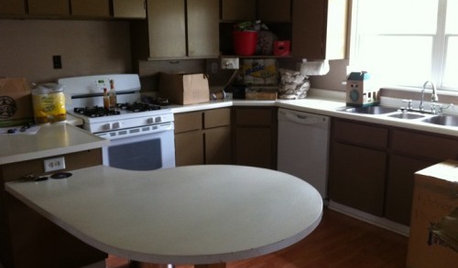Some more questions
rocksnmud
10 years ago
Related Stories

EXTERIORSCurb Appeal Feeling a Little Off? Some Questions to Consider
Color, scale, proportion, trim ... 14 things to think about if your exterior is bugging you
Full Story
FEEL-GOOD HOMEThe Question That Can Make You Love Your Home More
Change your relationship with your house for the better by focusing on the answer to something designers often ask
Full Story
5 Questions for Houzz Design Stars
Post Ideas for Updating an Exterior, Balancing an Off-Center Window and More
Full Story
GREEN DECORATING8 Questions to Help You See Through Green Hype
With the ecofriendly bandwagon picking up some dubious passengers, here's how to tell truly green products and services from the imposters
Full Story
REMODELING GUIDES9 Hard Questions to Ask When Shopping for Stone
Learn all about stone sizes, cracks, color issues and more so problems don't chip away at your design happiness later
Full Story
CURB APPEAL7 Questions to Help You Pick the Right Front-Yard Fence
Get over the hurdle of choosing a fence design by considering your needs, your home’s architecture and more
Full Story
Design Dilemmas: 5 Questions for Houzzers!
Post Ideas for Landscaping for a Modern Home, Updating a Rental and More
Full Story
5 Questions for Design Stars
Add Your Ideas for Outdoor Storage, Cheering Up a Fireplace and More
Full Story
Easy Green: 6 Must-Answer Questions Before You Buy
Thinking about buying ecofriendly furniture? For a truly environmentally conscious home, ask yourself these questions first
Full Story
More Discussions






sbryce_gw
equinoxequinox
Related Professionals
Lakewood Landscape Architects & Landscape Designers · Billerica Landscape Contractors · Buford Landscape Contractors · Cedar Hill Landscape Contractors · Gloucester Landscape Contractors · Medford Landscape Contractors · Santa Ana Landscape Contractors · Stony Brook Landscape Contractors · Whitehall Landscape Contractors · Cedar Hill General Contractors · Dover General Contractors · Flint General Contractors · Mineral Wells General Contractors · North Highlands General Contractors · Redan General ContractorsrocksnmudOriginal Author
sbryce_gw
equinoxequinox
Jasdip
rocksnmudOriginal Author
sbryce_gw
rocksnmudOriginal Author
sbryce_gw
equinoxequinox
rocksnmudOriginal Author